Direction:
Train:
Bus: Bus #272
Prior to our trip, we already researched about Tosokchon. It is said to be the best place in Seoul that serves their famous chicken dish: Samgyetang. In general term, this is a chicken stew with Ginseng. For K-drama fans, this is the chicken soup mostly featured in historical series.
Direction to Tosokchon from Gyeongbokgung:
Gyeongbokgung Station (Seoul Subway Line 3), Exit 2/from Gyeongbokgung
Go straight about 170m and turn left onto Jahamun-ro 5-gil Road.
Tosokchon (토속촌) is located 10m ahead on the left.
TOSOKCHON
We already anticipated a long line outside, but to our surprise, the queue was not as long as what we have expected. The key is to go to this place nearly after lunch time. While waiting for our turn outside, we had fun taking pictures of the place’s facade.
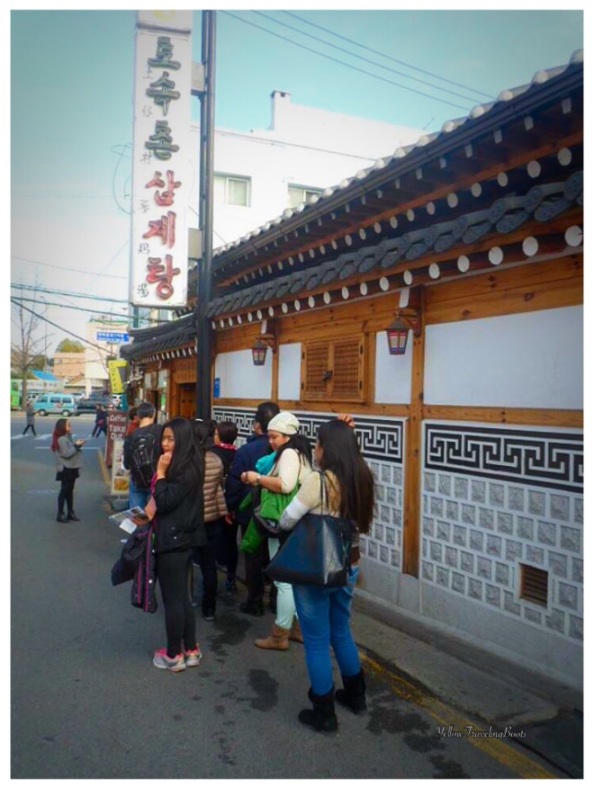 The line was relatively shorter at 1:00 PM
The line was relatively shorter at 1:00 PM
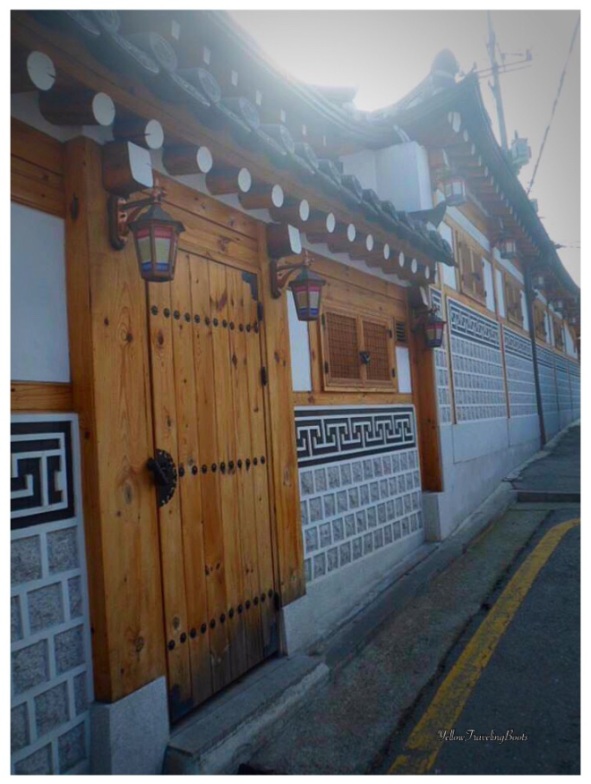 Notice the incredible design of the place: the roof, the door, the lamp, the wall, and everything else
Notice the incredible design of the place: the roof, the door, the lamp, the wall, and everything else
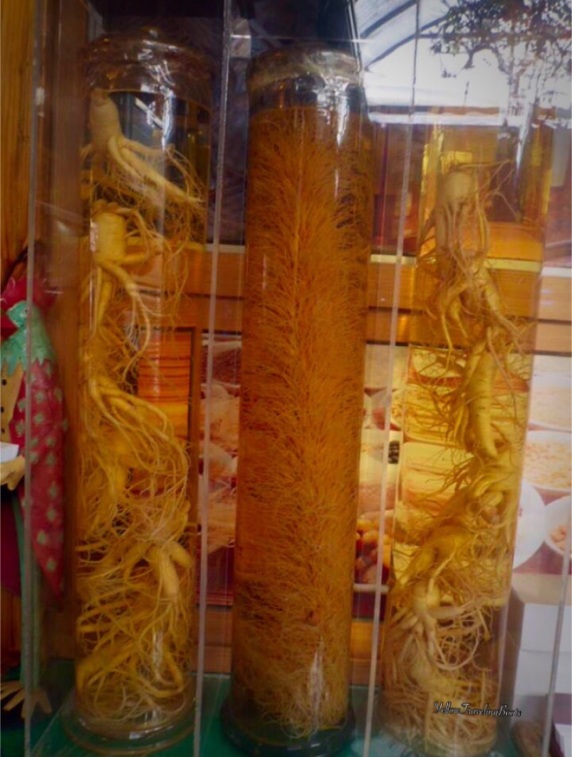 Inside, you will see their huge display of Ginseng!
Inside, you will see their huge display of Ginseng!
The interior of the place is similar to a house. Everyone is required to remove their footwear outside the door. You will also be sitting on the floor with throw pillows which I find interesting. Since the place is known for their Samgyetang, the food choices on their menu are limited.
Finally, here comes our Samgyetang! One bowl is around 15,000 KRW (600 PHP) and it can be shared by two people.
If you are used to the tasty flavor of a chicken stew, samgyetang is different. It has bland taste that goes perfectly well with the kimchi. I love how the ginseng flavor was not too strong in my soup too.
Before you are finished eating, they will give you your bill which you can bring outside to the counter to pay before you leave the place.
Right after eating, we headed to our next destination – Gyeongbokgung palace. It was a 15-min walk from Tosokchon.
GYEONGBOKGUNG PALACE
This place was built in 1395 and was referred to as the “Northern Palace”. The palace today remains the biggest and grandest among the five famous palaces in South Korea. Every hour, the palace will change guards and the ritual for this is a must see: we were very lucky to have witnessed it right on time!
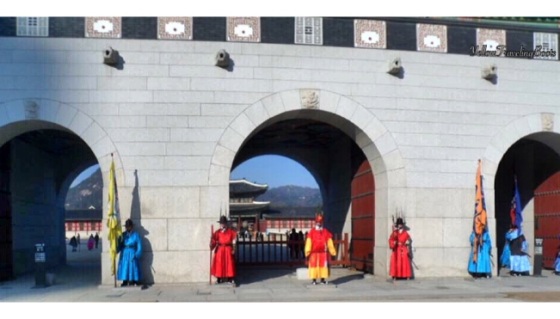 The palace guards before the ritual
The palace guards before the ritual
Changing of Guards
The view of the entrance from inside the palace
Gyeonghoeru Pavilion
The pond where Gyeonghoeru Pavilion is located
My bestfriend’s picture at the pond
My picture with the pavilion at the background
 Impressive pillars of Gyeongbokgung
Impressive pillars of Gyeongbokgung
The palace is really big and there are plenty of beautiful sights inside! You can alot two hours to make the most of your sight-seeing here.
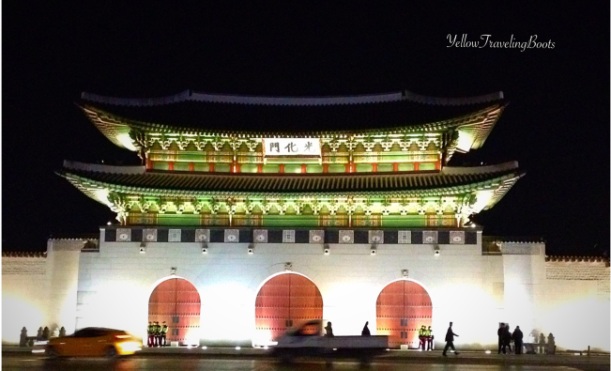 Gyeongbokgung looks magnificent at night.
Gyeongbokgung looks magnificent at night.
Important Information about Gyeongbokgung:
1) Operating hours
January-February 09:00-17:00 / March-May 09:00-18:00
June-August 09:00-18:30 / September-October 09:00-18:00
November-December 09:00-17:00
2) Admission
10,000 KRW (Integrated Ticket)
Free every last Wednesday of the month
Adults (ages 19-64): 3,000 won / Group (over 10 years): 2,400 won
Children (ages 7-18): 1,500 won / Group (over 10 years): 1,200 won
3) Closed on Tuesday
4) Tour Schedule
English: 11:00, 13:30, 15:30
Japanese: 10:00, 12:30, 14:30
Chinese: 10:30, 13:00, 15:00
5) Just across Gyeongbokgung is the Gwanghwamun Square. Never miss the chance to explore this place!
We still had ample of time to spare for that day so we decided to squeeze one of the destinations for the following day: Seonjeongneung!
SEONJEONGNEUNG
Direction:
Train:
Seolleung Station (Seoul Subway Line No. 2) Exit 8.
Go straight along Seolleung-ro street for 5 min.
Bus: Take bus nos. 472, 6411, 4412, or 3219
Seonjeongneung is a UNESCO World Heritage that comprises the Seolleung Royal Tomb and the Jeongneung Royal Tomb. Surprisingly, these two royal tombs are located in a forest park surrounded by high rise buildings.
Seolleung is the royal tomb of the 9th ruler King Seongjong (1457-1494) while Jeongneung is the tomb of King Jungjong (1488-1544), the second son of King Seongjong.
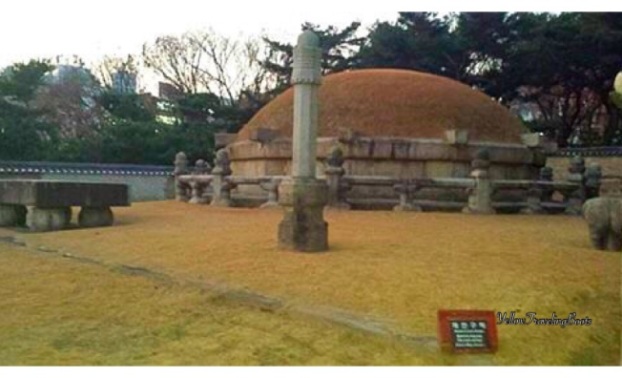 Burial Area where the tomb mounds are laid out
Burial Area where the tomb mounds are laid out
It was already dark when we reached the place
Stone figures guarding the tomb
Guarding the tomb are sculptures of sheep and tigers. There is also a statue of a military officer bearing a sword. In front of the tomb is a pair of stones ‘Mangjuseok’ designed to guide the dead king to the tomb.
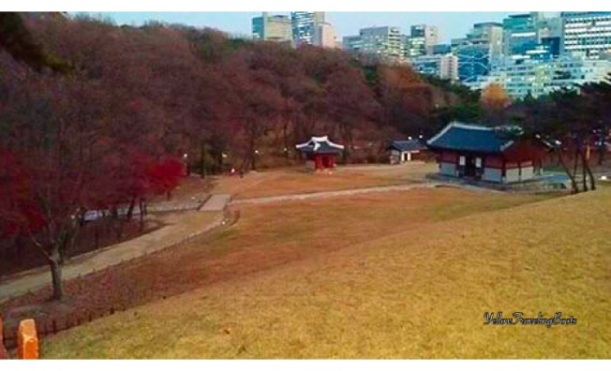 This is the “Ceremonial” area where the living meets the deceased through memorial rites
This is the “Ceremonial” area where the living meets the deceased through memorial rites
Important Information about Seonjeongneung:
1). Closed on Mondays
2) Operating Hours:
Mar – Oct 06:00-21:00 / Nov – Feb 06:30-21:00
Last Admission: 1 hours before closing.
3) Admission:
Free entry every last Wednesday of the month
Individuals (ages 25-64) – 1,000 won / Group (10 or more people) – 800 won
4) If you want to explore the place fully and take great shots, a day tour would be most ideal since lighting around the place can be challenging from 6:00 PM onwards.
It was already past 07:00 PM when we departed Seonjeongneung to our last destination for that day: Cheonggyecheon! Can you just imagine how much walk we did starting 09:00 am?!
When planning your itinerary, always consider the topography and climate of the place, travel time, mode of transportation, and how much you want to see for the day. It would really help you a lot! In our case, we wanted to see as much places as we can for our four-day trip in Seoul, so we were motivated by this goal.
CHEONGGYECHEON
Direction:
Train:
– Jongno 3-ga (Seoul Subway Line 1, 3 and 5)
– Dongdaemun History & Culture Park (Seoul Subway Line 4)
– Gwanghwamun (Seoul Subway Line 5)
Bus: Take any bus bound for Gwanghwamun or Jongno.
Cheonggye Plaza/Gwanghwamun Square
Just across Gyeongbokgung palace is a long stretch of very wide plaza known as the Cheonggye Plaza. The Plaza is roughly 160 m long and 50 m wide, and around 2,500 square meters in total.
As you leisurely stroll the plaza,you will pass by significant tourist spots like Dongdaemun, Namdaemun, City hall, Gwanghwamun, Seoul Plaza, Insa-dong Street, Gyeongbukgung, and Cheonggyecheon Stream among others.
The famous statues of the two influential people in Korean history: Admiral Yi Sun-Shin and Sejong the Great are situated at Gwanghwamun Square where the beatification ceremony took place.
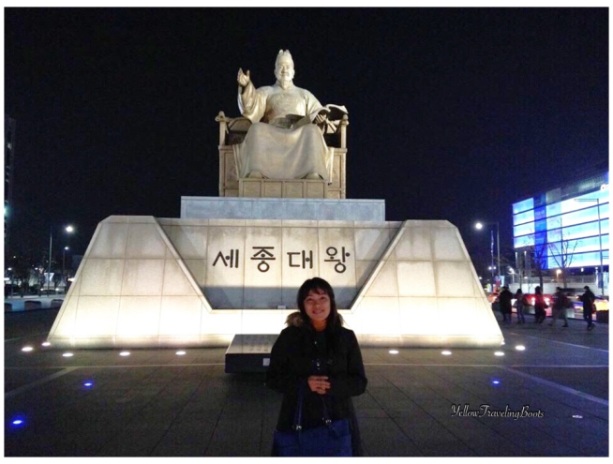 Me at the Statue of King Sejong the Great
Me at the Statue of King Sejong the Great
Statue of Admiral Yi Sun-Shin
As we walked further away, we saw this awesome cone which serves as a landmark to the Cheonggye Plaza where the Cheonggyecheon Stream is located. The stream is an elevated highway which runs 8.4 kilometers (5.2 miles) through the heart of Seoul.
A cone-shaped stonework inspired by “bojagi” – a colorful Korean cloth
The waterfall of Cheonggyecheon Stream showing off beautiful LED lights at night
Cheonggyecheon Stream
YTB recommends that you linger in this place before you head home for the night. There are performances in the street that you can enjoy along with some food.
Finally, we were about to have our dinner but for some reason, we never felt hungry after a rigorous whole afternoon trip. So instead of grabbing a heavy meal for dinner, we decided to try the food stalls at Myeongdong! Any Korean trip would not be complete without it I tell you!
Look at these huge sticks of meatballs – very delicious!
Dessert
These spicy rice cakes are the best!
The ladies enjoying the street food experience
Overall, we visited three UNESCO heritage sites for this day, completed eight destinations, had the most hilarious boo boo for the day (the full story will be revealed on a separate entry), and by far, the most tiring yet fulfilling day of our trip (imagine, we walked from 09:00 am through 11:00 PM)!
Below is the summary of our day three full itinerary which you can use as a reference.
Seoul Itinerary Day 3:
Next on YellowTravelingBoots: Seoul Itinerary Day 4: Ewha Women’s University (Part 1)


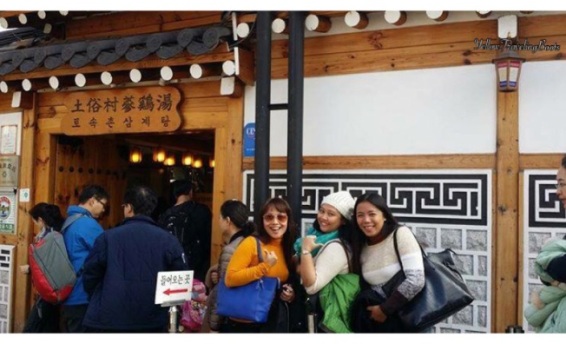
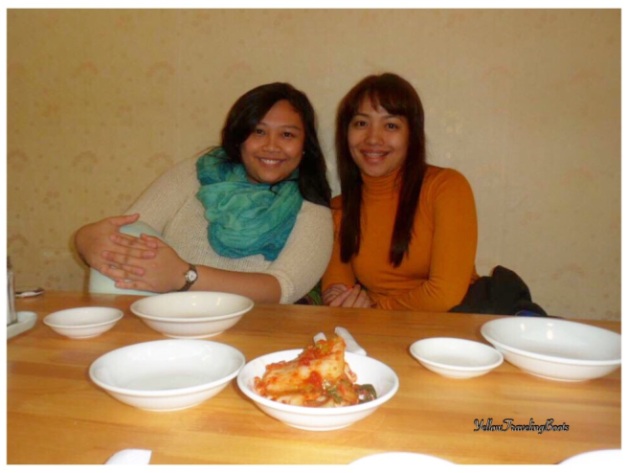
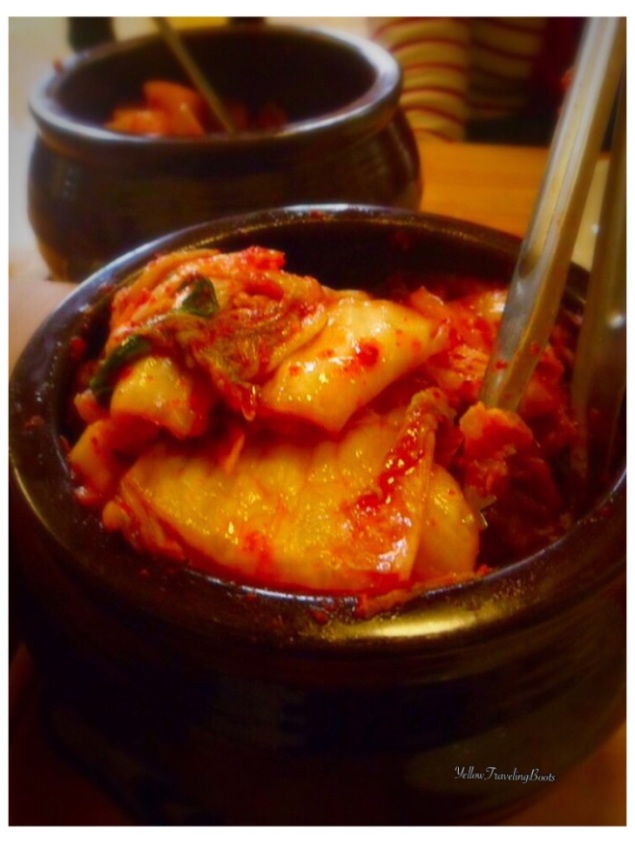
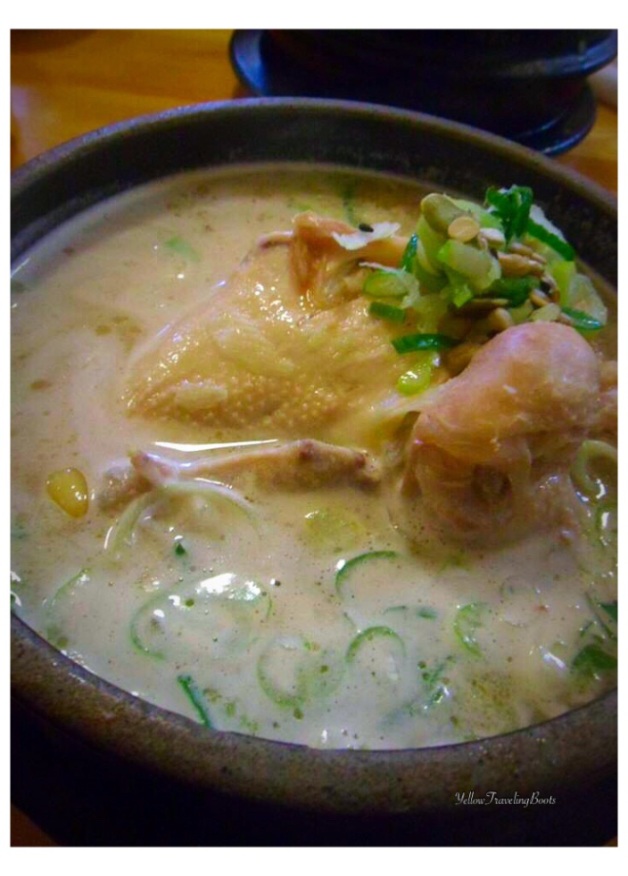
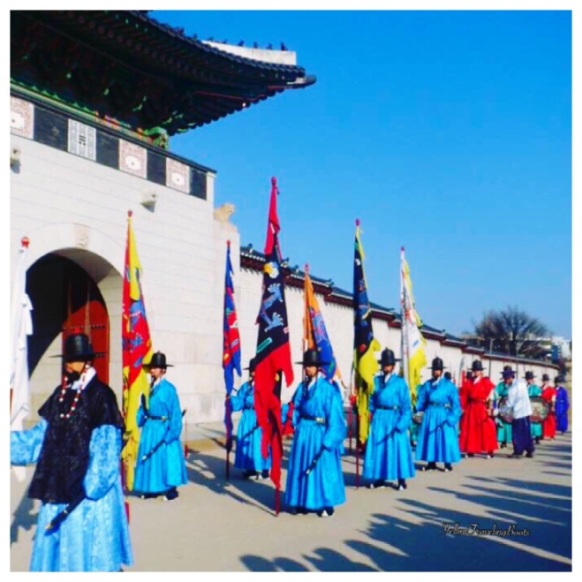
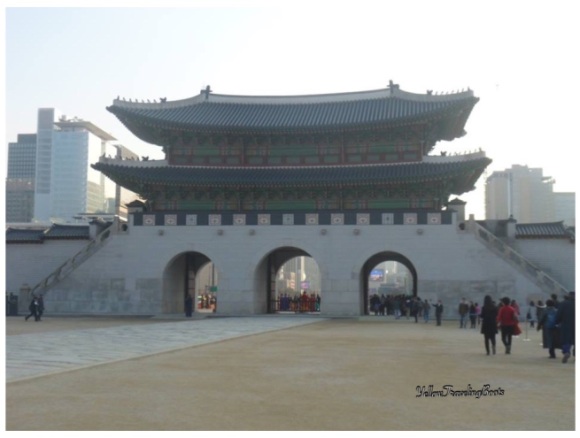
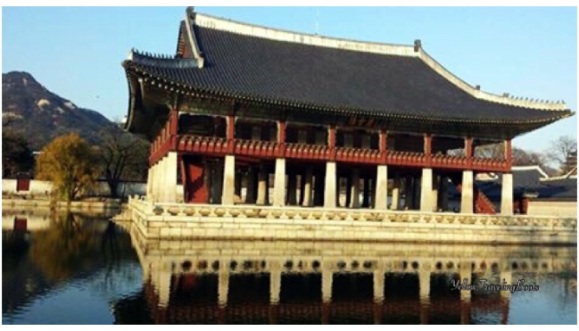
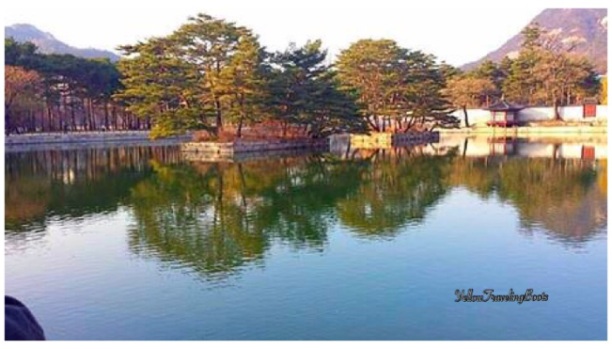
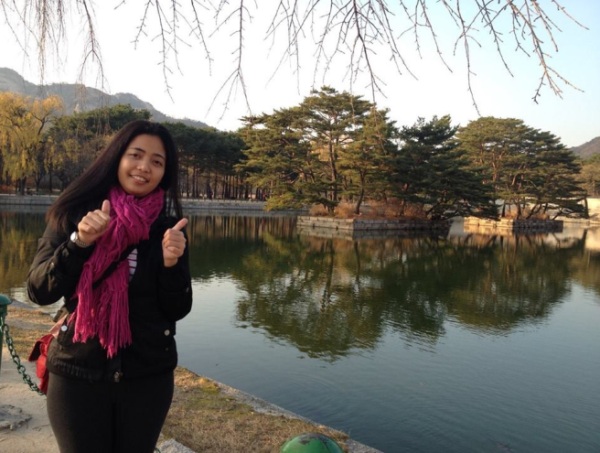
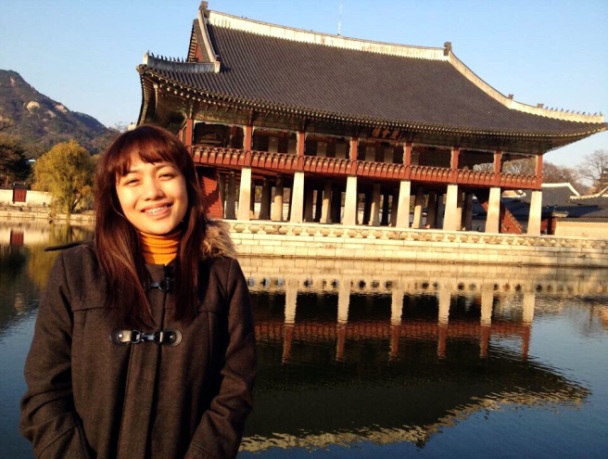
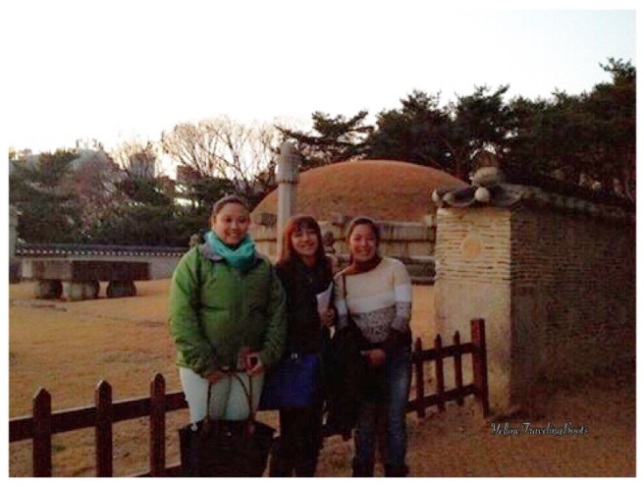
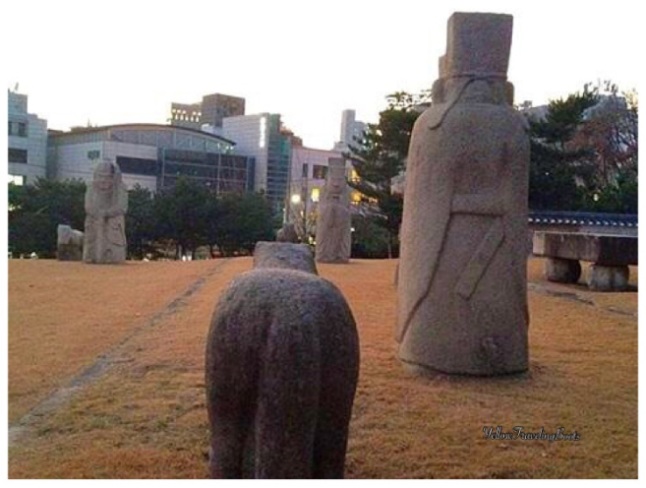
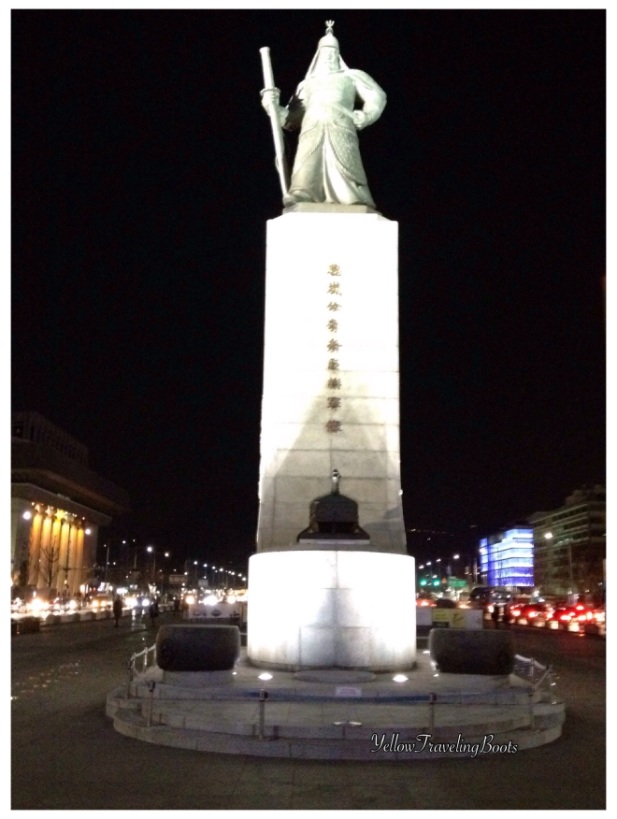
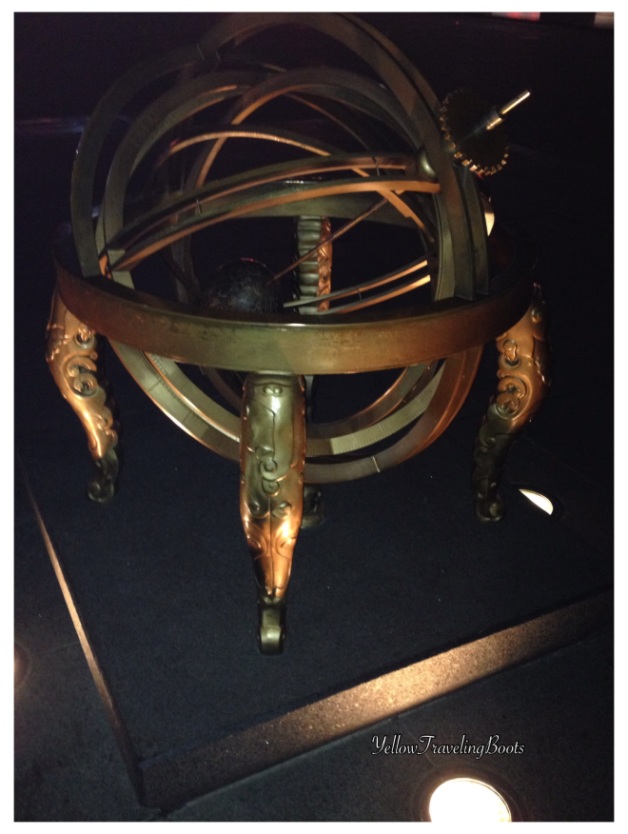
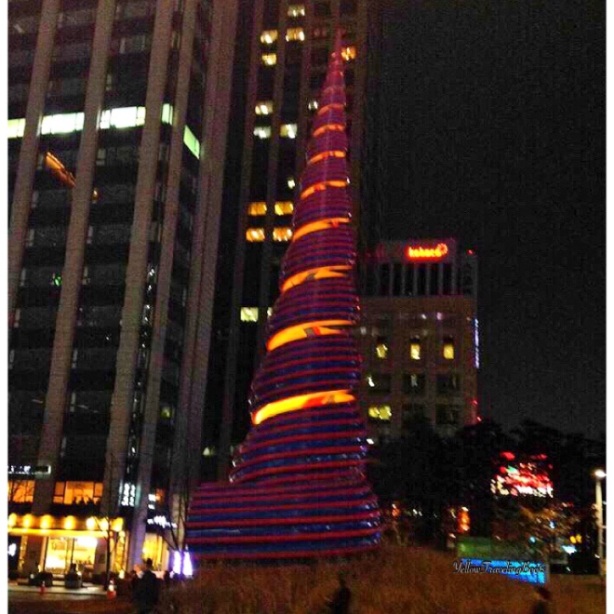
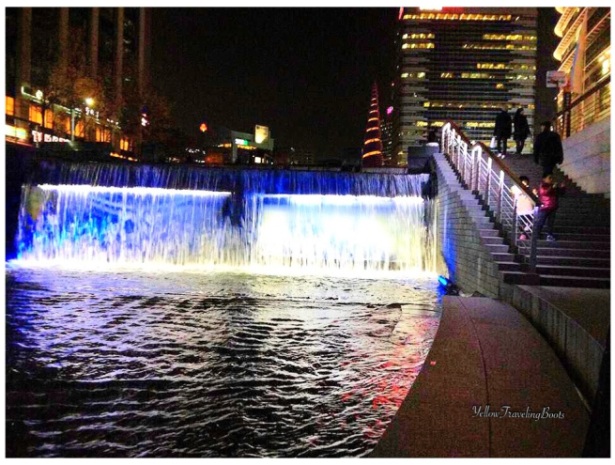
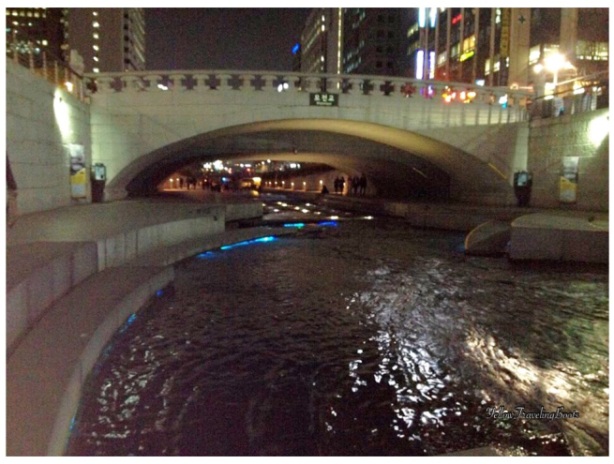
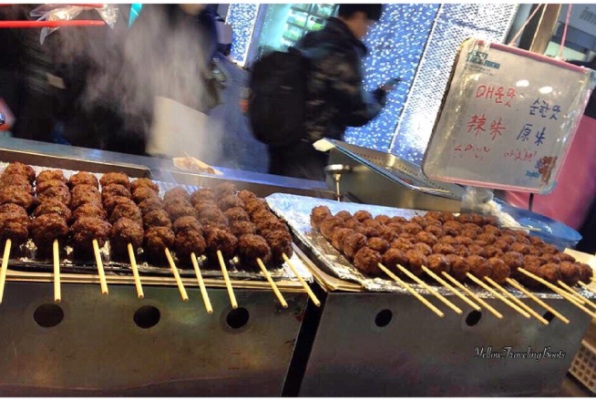
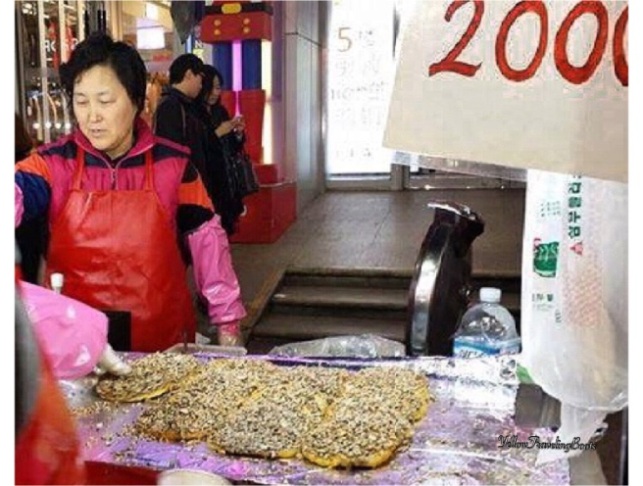
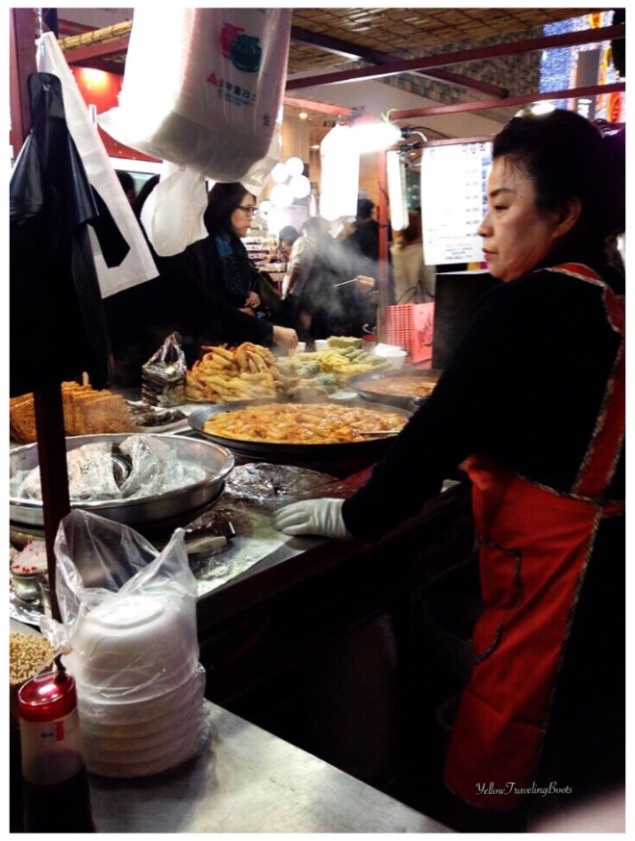
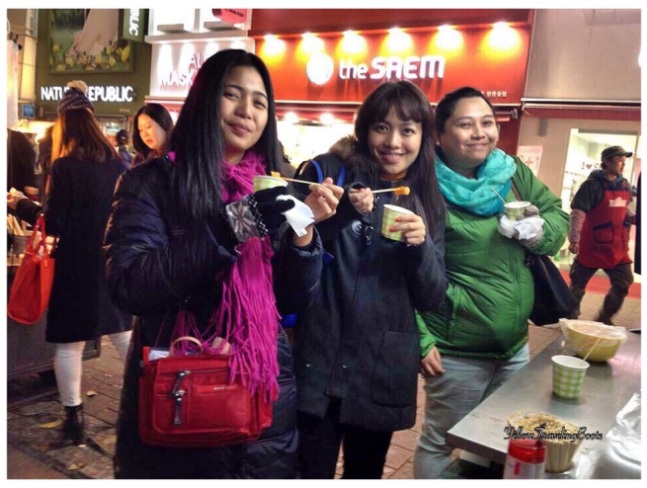
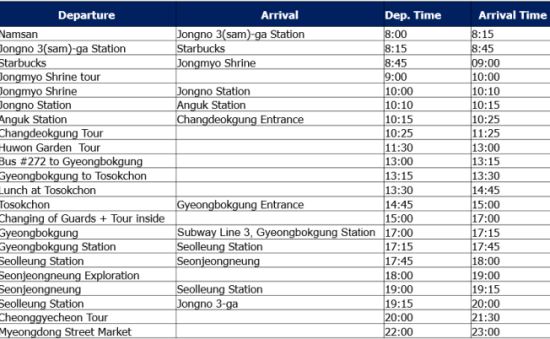




1 Comment